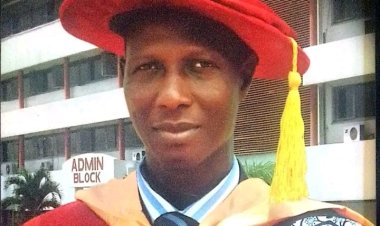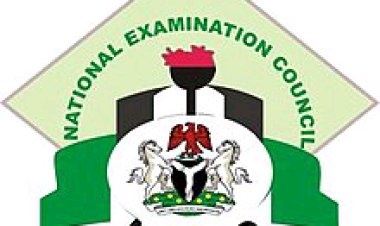Dr Kwaja urges politicians to show interest in academic conferences and public lectures
Dr Kwaja urges politicians to show interest in academic conferences and public lectures

Dr Chris Kwaja has called on politicians to show interest and participate actively in academic conferences and public lectures to make informed decision.
Kwaja spoke during the inauguration of the Centre for Security Studies of the Federal University of Lafia (FULafia) held at the Faculty of Agriculture Auditorium, Permanent Site Campus of the University.
He decried situations where politicians would attend events where matters of public importance were discussed only to stay a few minutes, saying until those who are in charge of our public affairs participate actively in academic conferences and public lectures it would be difficult to implement recommendations that would impact positively on good governance.
Dr Kwaja who was the guest lecturer at the maiden public lecture of the Inauguration of the Centre for Security Studies of FULafia delivered a lecture on the topic: Democracy and Security Governance in Nigeria: Looking Beyond the State
He thanked Professor Shehu Abdul Rahman and the flagship Director of the Centre for Security Studies, Professor George Genyi, for finding him worthy of delivering the lecture.
He said the topic for the lecture was apt, timely, and germane because it highlights a crucial issue in Nigeria’s contemporary national discourse.
Kwaja, who is also the Director, Centre for Peace and Security Studies, Madibo Adama University, Yola, Adama State noted that although democracy has become globally fashionable, current and mainstream, that does not necessarily purport that it is the best system of government.
"Over the years, democracy has been associated with sundry excesses and inadequacies which have left people to become not only critical but also skeptical about its essence and promise,” he said.
He observed that although the Nigerian state was supposed to represent the legal basis for sovereignty, authority and legitimacy, loyalty to sub-national identities continued to threaten the legitimacy and existence of the state.
Kwaja said that the growing influence of centrifugal forces - religion, ethnicity and regionalism continues to weaken the nation and state-building project of the country, which accounted for the rising spate of discontent in the country in a significant way.
The guest lecturer stated that the character of security governance in Nigeria reflects the praetorian tendency of the country’s national security architecture which, invariably, is a consequence of the country’s protracted military rule heritage.
He said another important attribute of security governance in Nigeria is the syndrome of politicisation of security and securitisation of politics where the state decides what constitutes a threat to national security and the requisite response to that effect, often by way of political correctness or determinism.
Kwaja further stated that security is the essence of the state and the reason for its existence. Hence, security governance is indispensable to statecraft noting that security governance in a democracy is a state-society partnership, whereby the government and the citizenry are joint stakeholders; both the government and the governed are mutually reinforcing, towards the protection of life and safeguarding the nation.
He observed that the current security situation in Nigeria has been best described as a complex threat scenario, and a huge policing problem saying that no part of the country is exempted from the prevailing malaise of insecurity.
The security expert lamented that Nigeria was in dire need of the requisite conditions of stability and security to achieve the targets of the Sustainable Development Goals (SDGs).
Dr Kwaja also stated that the prevailing security threats in Nigeria were complex and dynamic intersecting and converging into a nebulous mix that conflates understanding and remediation, declaring that “the gamut of national security challenges in Nigeria puts pressure on the already structurally challenged and overwhelmed national security architecture.”
He said security governance is a collective public responsibility in which the state and the civil society are mutual stakeholders noting that the potentials of the non-state sector have been largely under-explored or neglected.
He emphasised the need to explore possible and viable non-state avenues for security governance to meet the demands of the challenging situation.
Kwaja recommended that University-based think tanks, as well as other centres of learning, should be well-resourced financially and technically, to provide relevant technocratic insights to inform and guide security policy and strategy, guarantee people’s participation in governance, mainstream gender in Democracy and Security, support community-based peace infrastructure by strengthening partnership with traditional authorities, faith-based institutions, women and youth groups, civil society organisations and the media to enhance existing community-based peace infrastructures and conflict early warning systems.
He concluded that a discourse on the linkages between democracy, governance, and security should be anchored on a sound logic that places the intellectuals as the leading lights in the search for a better society calling on the Centre of Security Studies, Federal University, Lafia, Nasarawa State, Nigeria, to focus on providing sound logical intellectual ideas to avoid stepping on this slippery ground.
Dignitaries at the event included His Excellency, Engineer Abdullahi A. Sule, the Governor of Nasarawa State, who was represented by the Amb. Timothy Kasuwa, the Commissioner for Special Duties, Security and Public Matters, Major General A.T. Umar who chairs the occasion, the Vice-Chancellor of the Federal University of Lafia, Prof. Shehu Abdul Rahman, represented by the Deputy Vice-Chancellor, Administration, Prof. Ali Is'haq Shugaba, the Deputy Vice-Chancellor of research and Partnerships, Prof. Samaila Dakyes, Registrar, Mallam Nuradeen Abdu, representative of the University Librarian, Dr. Akanmidu Olamide Johnson, Deans and Directors of the University, Senior Deputy Registrars, Heads of Departments, staff, and students.
Also, in attendance were the Director, of the Department of State Service, Nasarawa State, the Commandant, of Nigerian Security and Civil Defense Corps, Nasarawa State, Commander, of 4 Special Forces Command Doma, Nasarawa State, Controller of Immigration, Nasarawa State, Commandant, Command Science Secondary School, Lafia and Arc. Ahmed Abdullahi Isah, of the SDGs Planning House.

 Amanna
Amanna 



